How to get cat pee smell out of your home — 5 steps to solving feline mishaps
Learn how to get cat pee smell out of your home for good

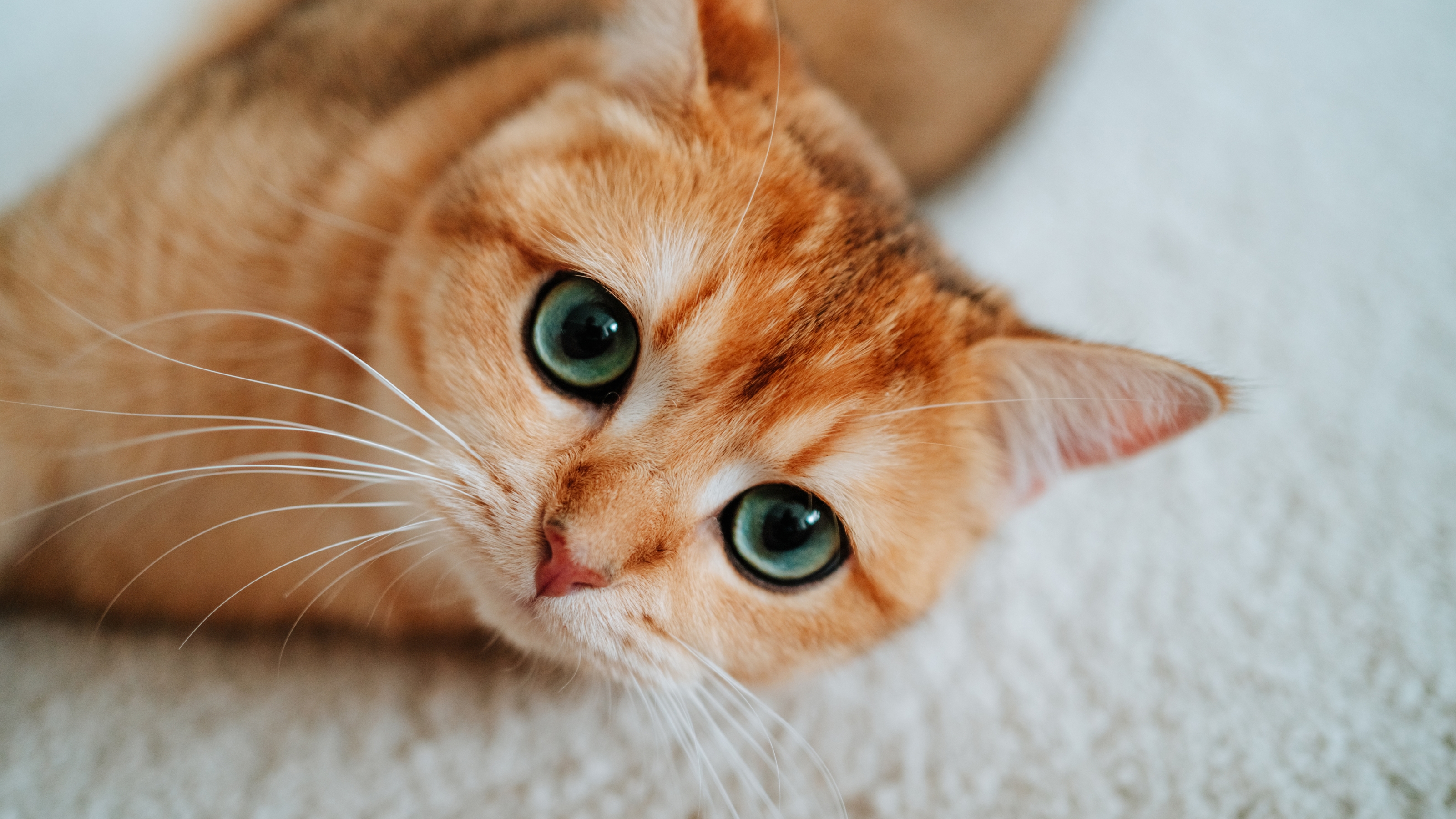
If you're a cat owner, knowing how to get cat pee smell out of your home is key to maintaining a clean, fresh and welcoming environment because even the best-behaved floofs can have accidents.
From couch to carpet, our cleaning and animal experts will walk you through exactly how to remove cat pee smell from the most tinkle-prone spots around the home.
If you need to remove pet urine smells and stains, look no further. Though cat pee is a strong odor, following these simple steps will help you eliminate it with ease.
How to get cat pee smell out of your home like a pro
For cat owners, your house cleaning checklist starts with tackling feline-favored spots. Whether that's cleaning pee from a couch, your hardwood floors, upholstery, your mattress or even stubborn stains and spills in or around the litter box, our experts will walk you through the five simple steps to remove pungent cat urine smells effectively.
Where our experts have recommended products, we've matched their suggestions with highly-rated items from trusted retailers to help you shop the fix now.
All prices were correct at time of publication.
Cleaning cat pee from carpets
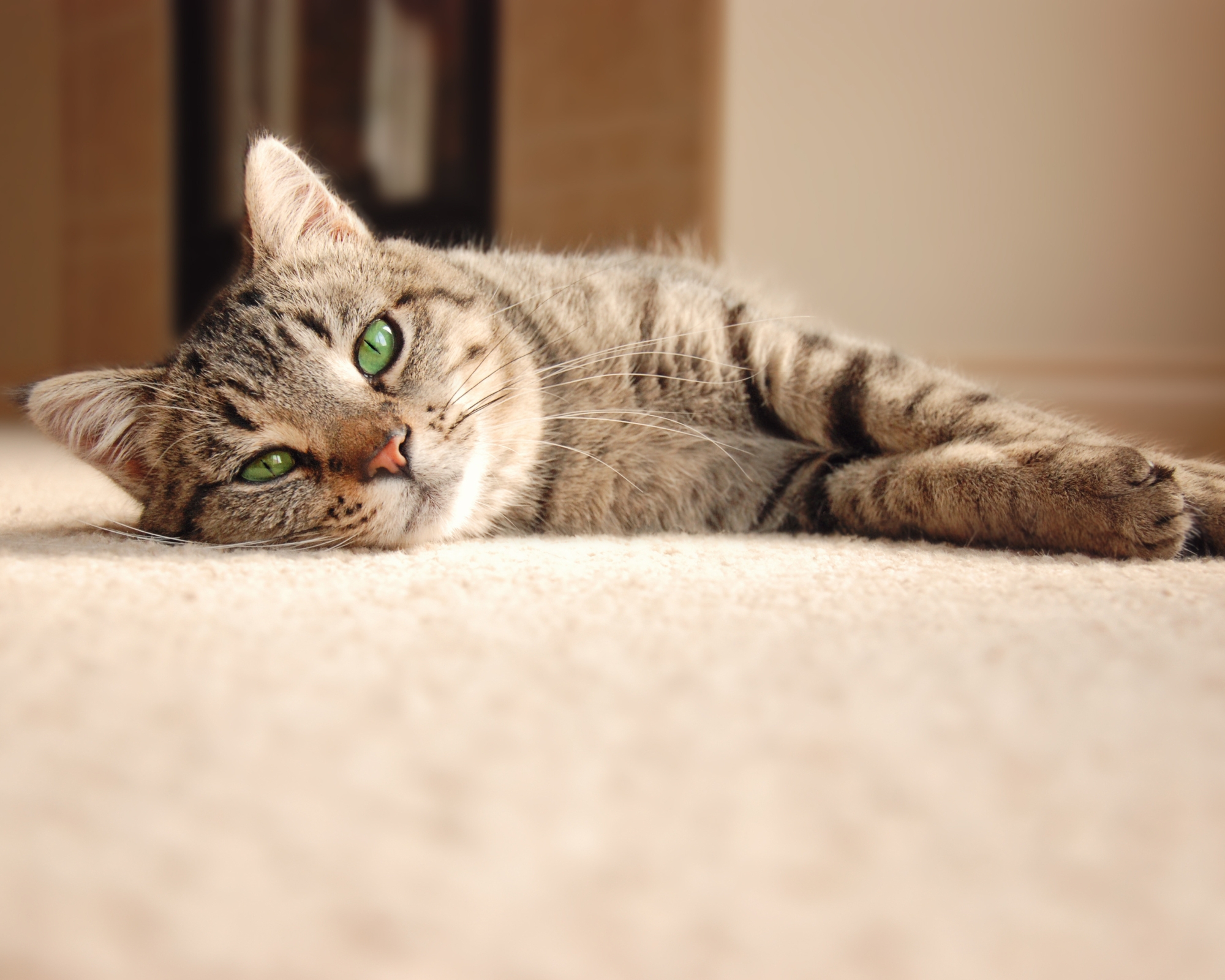
Cat urine on carpet is easily dealt with if you act fast.
Get small space home decor ideas, celeb inspiration, DIY tips and more, straight to your inbox!
Wells Ye, founder of Fresh Tech Maid, says, "As soon as a fresh carpet puddle appears, you must move immediately! Utilize a clean, absorbent material, such paper towels or a microfiber cloth, to suck up as much liquid as possible. Avoid rubbing, as doing so could make the problem worse."
Once you've soaked up as much urine as possible, spray a solution of one part white vinegar, one part water, and thoroughly soak the area. Let it sit for about 10-15 minutes before blotting it dry.
Wells says, "Next, it's time for your secret weapon — baking soda. Sprinkle a good amount over the impacted region, allowing it to sit. All the moisture present in that area will be absorbed and the smell will be neutralized in the process too."
After 30 minutes (or more if you can spare it), vacuum away the baking soda. In most cases, the smell should now have gone. If not, turn to an odor-busting enzyme cleaner specifically for the job. Wells recommends Begley's Natural Pet Stain & Odor Remover from Amazon, which has a fresh citrus scent.
Wells adds, "For an extra punch, consider an enzymatic cleaner. These contain odor-eating bacteria that break down the uric acid crystals causing the stench. Leave it for around 15 minutes, or whatever is recommended on the bottle.
"Blot the cleansed area with a fresh, microfiber cloth, then leave the area to air dry completely."
Cleaning cat pee from hard floors
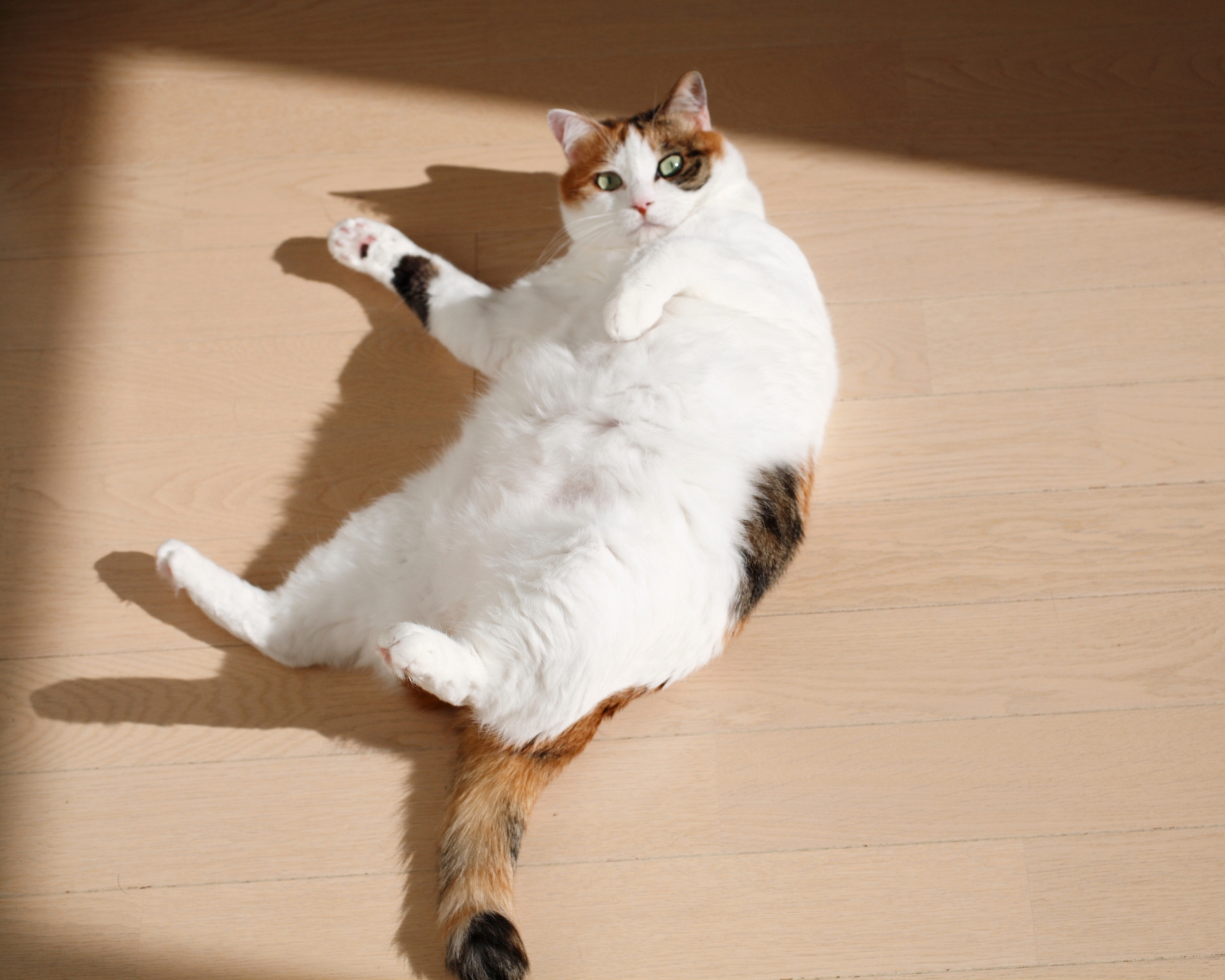
Knowing how to clean floors with vinegar is handy should your feline friend have an accident. Whether wood or laminate, quick action and a spritz of vinegar will have things sorted in no time.
Vanessa Bossart, founder of GreenTerra Cleaning, says, "Whether tile or wood, hard floors require prompt and effective cleaning to prevent urine from seeping into cracks and causing long-term odors.
"Start by wiping up the urine immediately with paper towels or a cloth. Clean the area with a solution of one part white vinegar and one part water. It’s important to avoid using harsh chemicals on wood floors, as they can damage the finish — vinegar is safe for most hard floor surfaces and helps neutralize odors effectively."
Then, use a damp cloth to remove any vinegar residue on the area, and dry thoroughly with a clean towel to prevent moisture damage. Excessive moisture can warp some floors including laminate as it seeps into the cracks and causes swelling of the materials.
For persistent odors, a paste of baking soda and water, left to sit for a few hours, should absorb the odor. Wipe and dry thoroughly afterwards.
Amy Poulton, editor at Hometalk, adds, "Scrub the floor with an enzymatic cleaner and be prepared to apply more effort for tougher stains and repeat if necessary."
Both Amy and Vanessa recommend Nature's Miracle Cat Urine Remover Spray from Target for its effective bio-enzymatic formula.
Amy points out it's best to avoid using bleach. "When mixed with the ammonia in urine, it can create harmful chlorine gas," she says. "Plus, it doesn't neutralize odors, so the cat pee smell will return."
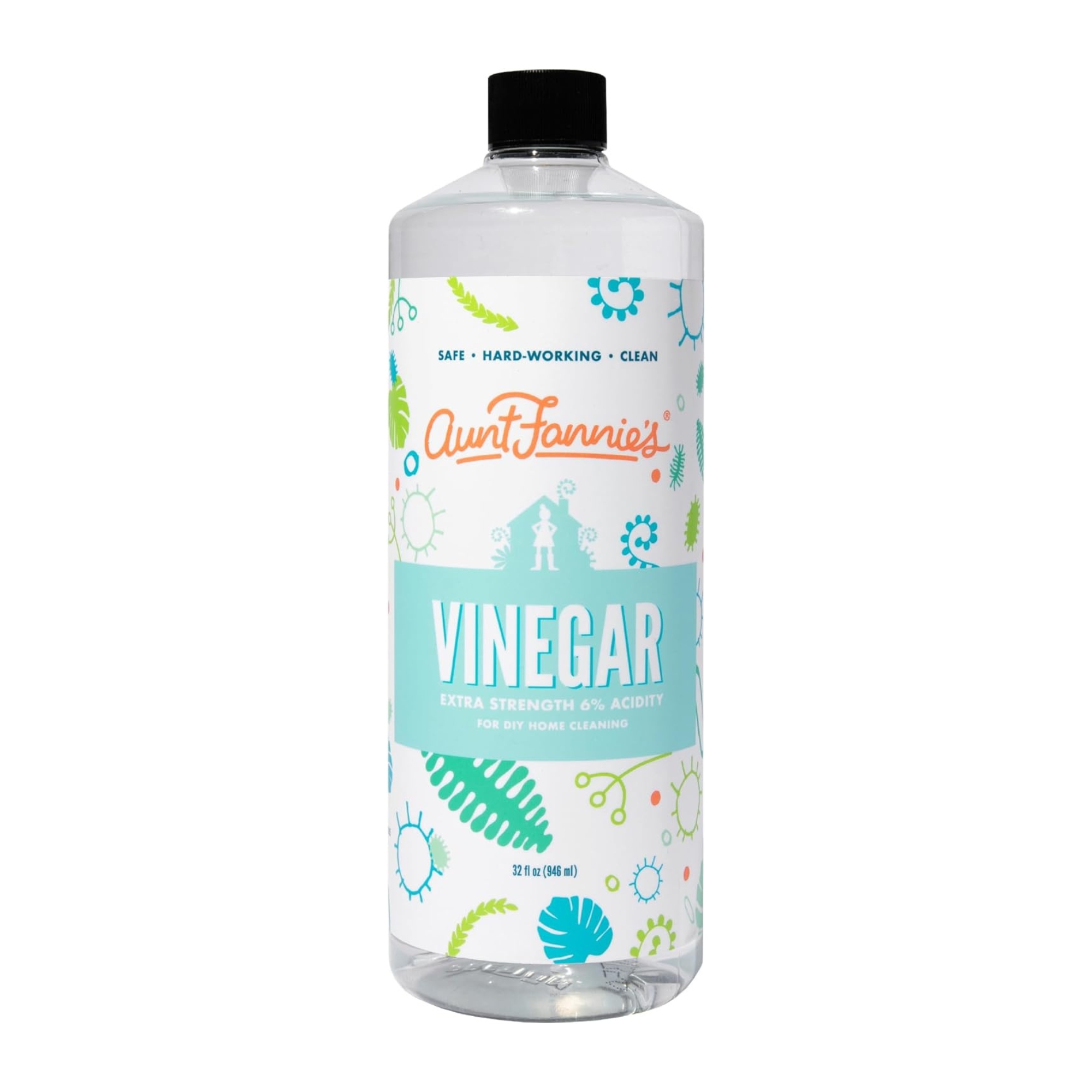
Price: $13.99
Size (fl oz): 32
This extra-strength, 6% acidity vinegar can be used to clean just about anything around the house, including nasty sink drains. It's suitable for multiple surfaces including wood and stone and will be your secret weapon in tackling cat pee stains around the home. You can use vinegar for a multitude of cleaning tasks so it won't go to waste.
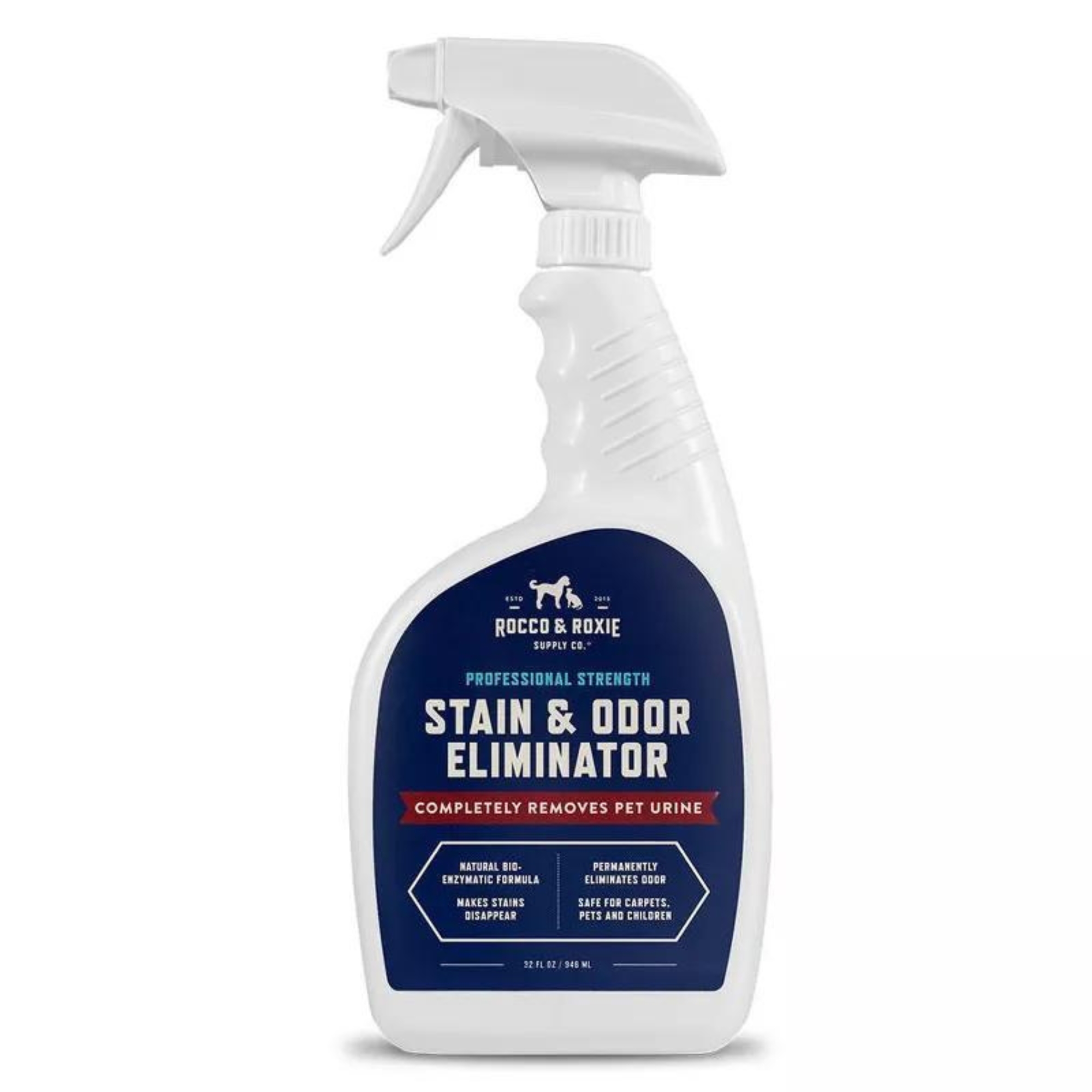
Price: $16.99
Size (fl oz): 32
This effective spray contains natural enzymatic bacteria that activate on contact with odors and stains, feeding on ammonia crystals and organic matter until completely eliminated. It is free from chlorine so the smell of the product won't give you a headache or take over the home the way some cleaning products do. If you don't like the smell of this cleaner, once you've nixed the cat pee smell, go over with your usual cleaner to eliminate.
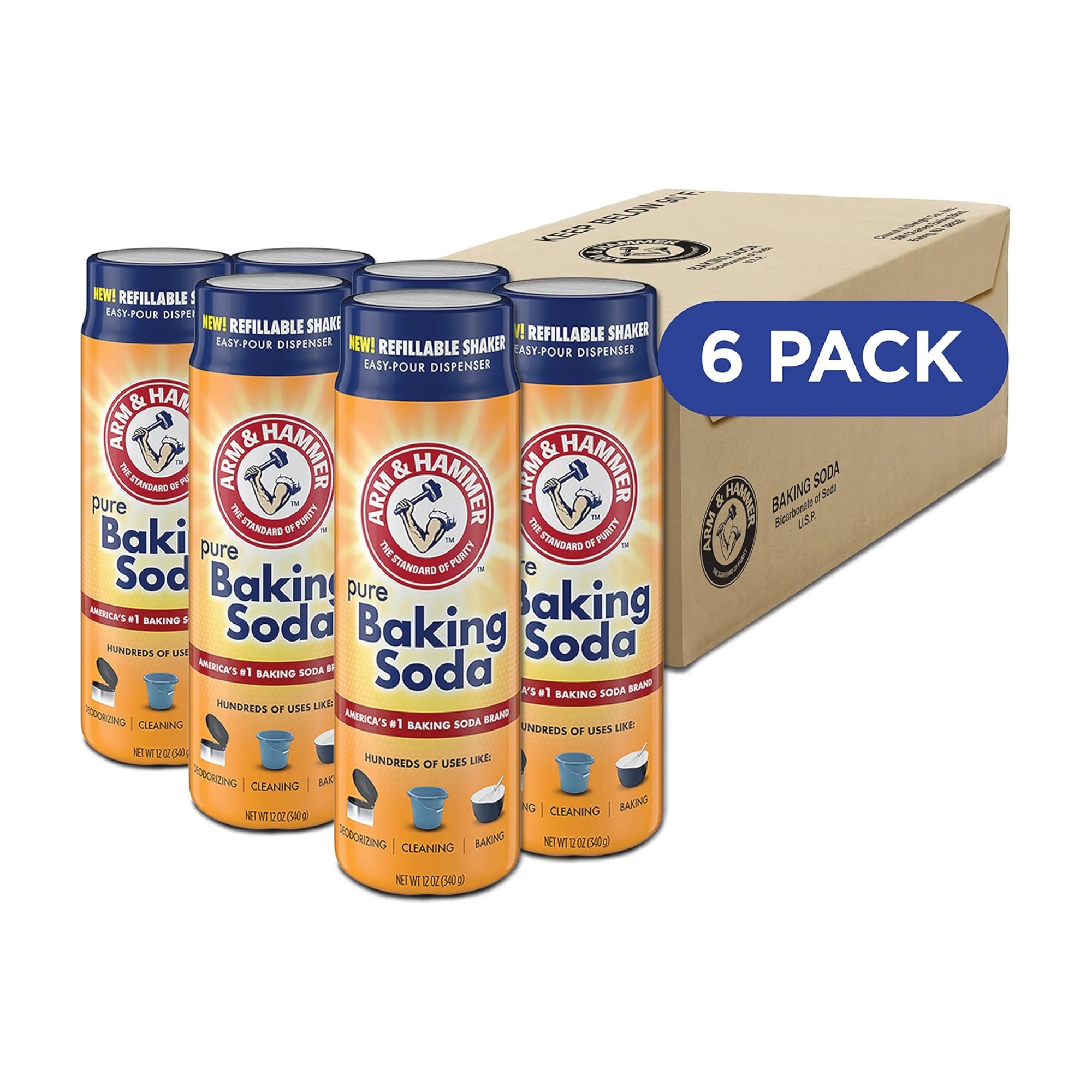
Price: $14.94
Size (oz): 12
Baking soda is great for getting rid of odors and is gentle so it won't wick away color or cause further issues. This six-pack will keep you stocked for a while, and each can comes with an easy-pour dispenser. Many shoppers commented on how handy the packaging is. It's recyclable but you'll need to peel the label off the lid to recycle that.
Cleaning cat pee off your couch
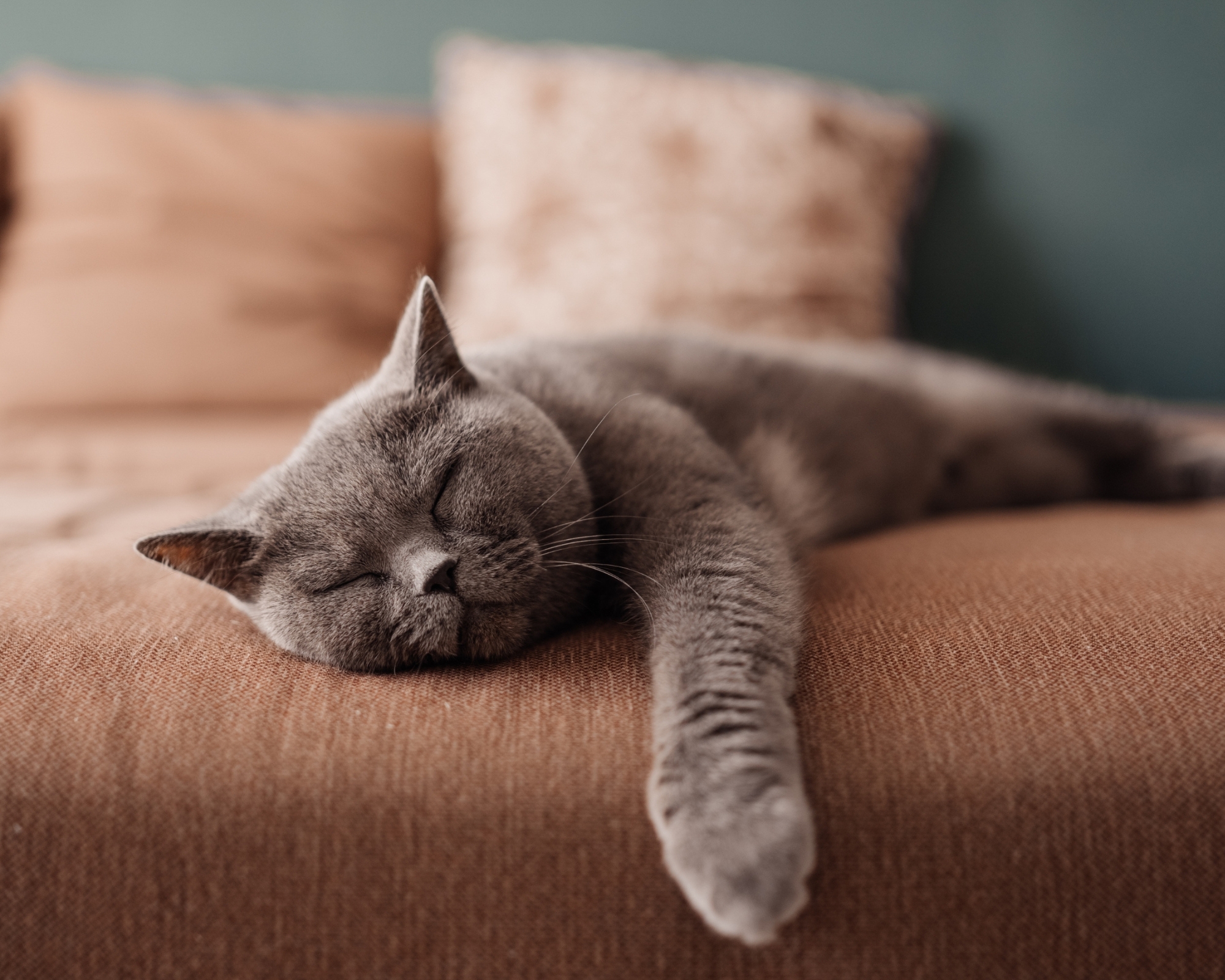
When cat urine gets on your couch or chair, it’s important to act quickly. Start by blotting up as much of the urine as possible with paper towels or a clean cloth. Avoid rubbing, as this can push the urine deeper into the fabric.
Once you've blotted the area, mix equal parts white vinegar and water in a spray bottle and generously spray the affected area. Vinegar neutralizes the ammonia in cat urine, which helps to reduce the smell. Let the solution sit for about 10-15 minutes, then blot it dry with a clean cloth.
Afterward, sprinkle baking soda over the area. Karina Toner, operations manager at Spekless Cleaning, says, “Baking soda is like fairy dust for odors. Sprinkle a generous amount over the area, making sure the entire stain is covered. Let it work its magic overnight, absorbing the unpleasantness.”
Finally, use the upholstery attachment as you vacuum up the baking soda. This step not only removes the baking soda but also any remaining dried urine particles that it has absorbed.
Read our review of the Brigii Crevice Vacuum and how it gets into those tough spaces, or our review of the Bissell Symphony Pet Steam Mop & Vacuum, which cleans both wet and dry messes.
If you're looking for a new vacuum, our best vacuums guide is a great place to start. As a cat owner, our guide on best vacuums for pet hair has many great buys, including our overall number one, Shark Stratos Cordless Pet Vacuum, which we gave five stars to in our review for function, suction, and ease of use.
For particularly stubborn smells, you can follow up with an enzyme cleaner, which breaks down the proteins in cat urine. Be sure to follow the instructions on the cleaner for the best results.
Cleaning cat pee from a mattress
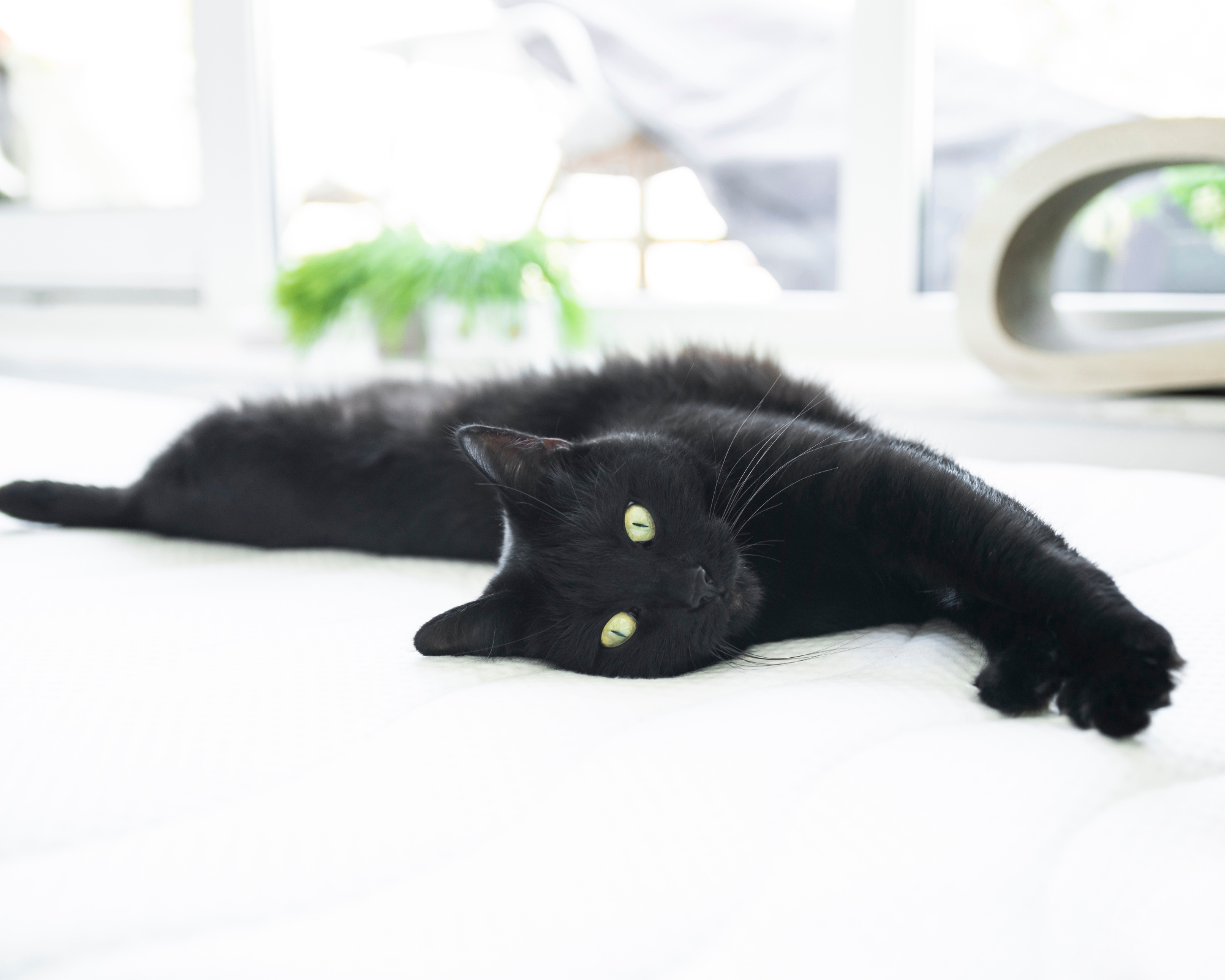
If your cat urinates on your mattress, immediate action is ideal due to the thick and dense nature of the item.
Amy says, "Act quickly, using paper towels or a clean cloth to absorb as much urine as possible. Next, combine equal parts white vinegar and water in a spray bottle.
Apply the solution to the stain and let it sit for 10 minutes, before blotting up any remaining liquid with a clean cloth. Finally, cover the area with baking soda and leave it for 8-10 hours to absorb odors, before removing the baking soda residue with a vacuum cleaner."
Dried cat pee smells and stains on your mattress require a different approach — the exact steps will depend on whether your mattress is made of memory foam or not.
If your mattress is not memory foam, begin by wetting the area by spraying a light mist of water over the stain.
Amy says, "Combine hydrogen peroxide, baking soda, and dish soap in a bowl. Apply the mixture to the stain with a clean cloth, letting it sit for 30 minutes. Blot up any excess moisture with a fresh cloth. Repeat until the stain is gone."
This up&up Hydrogen Peroxide from Target is a bargain.
For a memory-foam mattress, tackling dried stains begins by combining hydrogen peroxide and baking soda in a spray bottle.
Amy says, "Being careful not to shake the bottle, lightly spray the stain until damp, not soaked. You don't want to over-wet the mattress, especially with memory foam. Let the solution sit for one to two hours, then blot up any excess liquid with a clean cloth. Repeat until the stain disappears."
Cleaning cat pee smells from litter boxes
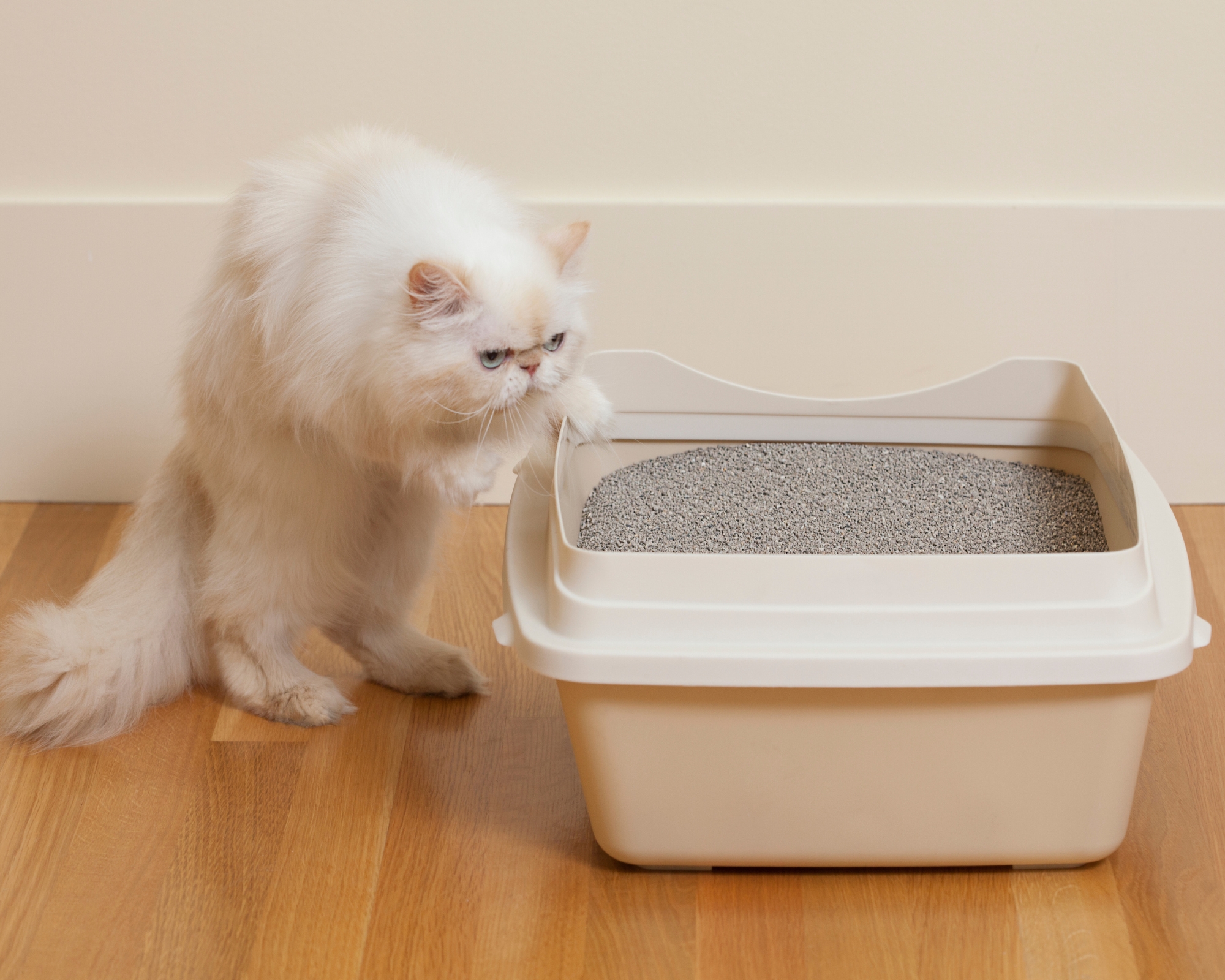
Preventing cat pee smell from taking over your home starts with proper litter box maintenance.
Twila McGee, founder of NOLAs Finest Pet Care, says, "Though, it's common for pets to have accidents when they are overly excited, scared, or nervous, if your cat frequently urinates in inappropriate places, it may be an issue with their potty area.
"Firstly, consider the location of your litter box. Cats tend to prefer having their litter box in a low-traffic area. For multiple cat households, you'll usually need more than one box as cats don't tend to like to share."
Next, consider cleanliness. Scoop the litter box daily to remove urine and feces, and change the litter completely at least once a week. Wash the litter box with mild soap and water during litter changes to remove any lingering odors.
Twila says, "Another important consideration is accessibility. If you have a stocky cat such as a Maine Coon and the litter box flips or moves when used, more than likely your cat won’t trust it and will refuse to use it. If you have an aging cat, similar to humans, they may encounter health issues like arthritis that can hinder their ability to reach the litter box."
If none of these seem to be the issue, it's possible your cat has a health concern.
Twila adds, "There are several other possible causes. For example, cats may develop UTIs and link them to the litter box, causing them to seek other places to relieve themselves. Seek advice from your veterinarian to address the issue."
Users of the Arm and Hammer Baking Soda on Amazon mentioned above say they sprinkle some into their kitty's litter tray to tackle smells. As an owner of two busy cats myself, I've found the quality of the litter you use really impacts how effective it is at handling the urine smells. The pattern we've noticed in our household is the cheaper the litter, the less effective is it at keeping cat pee smells locked in.
We've tried clumping and non-clumping, gravel and pellets and found non-clumping less high-maintenance.
The PetSafe ScoopFree Lavender Non-Clumping Crystal Cat Litter, Lightly Scented Litter on Amazon promises superior odor control and more than 45,000 customer reviews puts the average star rating at 4.4, with more than 10,000 purchases last month if you fancy giving this type a go.
Meet our experts

Karina is an Operations Manager at Spekless Cleaning, a respected cleaning company operating across multiple US states. She has more than 10 years' cleaning experience and is an expert in professional cleaning solutions and helping clients with sustainable and effective cleaning.

Vanessa Bossart is founder of GreenTerra Cleaning, which has made more than 28,000 American homes sparkle and aims to redefine cleanliness as the cornerstone of healthy, sustainable living. With 18 years’ experience in the cleaning industry, Vanessa is passionate about promoting eco-friendly cleaning practices that improve the health of her clients and the planet.
Now you know how to get cat pee smell out of your home, you can effectively eliminate pet pee stinks from your home and create a more pleasant environment for both you and your feline friends.
Next, learn how to remove pet odors from a small space, and the things people with nice-smelling homes never do.

I'm a senior writer with an English degree and NCJ qualification, plus years of experience writing news, lifestyle and consumer articles for the national and international press. I'm also a copywriter, working on a breadth of consumer and corporate projects, and a private education consultant. I live in the quiet of the countryside and love completing DIY tasks to breathe life into my small, newly-built home.


